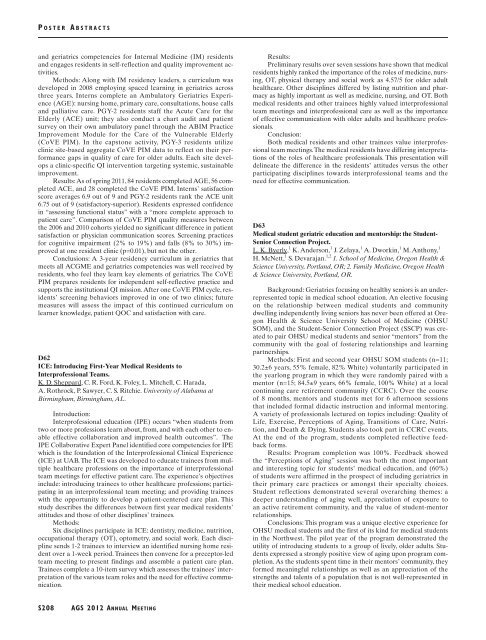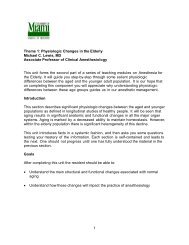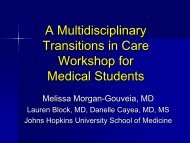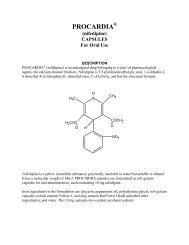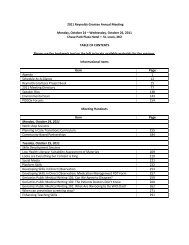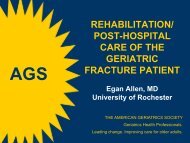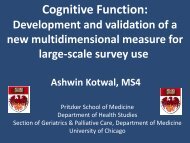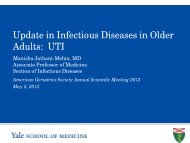Here - American Geriatrics Society
Here - American Geriatrics Society
Here - American Geriatrics Society
Create successful ePaper yourself
Turn your PDF publications into a flip-book with our unique Google optimized e-Paper software.
P OSTER<br />
A BSTRACTS<br />
and geriatrics competencies for Internal Medicine (IM) residents<br />
and engages residents in self-reflection and quality improvement activities.<br />
Methods: Along with IM residency leaders, a curriculum was<br />
developed in 2008 employing spaced learning in geriatrics across<br />
three years. Interns complete an Ambulatory <strong>Geriatrics</strong> Experience<br />
(AGE): nursing home, primary care, consultations, house calls<br />
and palliative care. PGY-2 residents staff the Acute Care for the<br />
Elderly (ACE) unit; they also conduct a chart audit and patient<br />
survey on their own ambulatory panel through the ABIM Practice<br />
Improvement Module for the Care of the Vulnerable Elderly<br />
(CoVE PIM). In the capstone activity, PGY-3 residents utilize<br />
clinic site-based aggregate CoVE PIM data to reflect on their performance<br />
gaps in quality of care for older adults. Each site develops<br />
a clinic-specific QI intervention targeting systemic, sustainable<br />
improvement.<br />
Results: As of spring 2011, 84 residents completed AGE, 56 completed<br />
ACE, and 28 completed the CoVE PIM. Interns’ satisfaction<br />
score averages 6.9 out of 9 and PGY-2 residents rank the ACE unit<br />
6.75 out of 9 (satisfactory-superior). Residents expressed confidence<br />
in “assessing functional status” with a “more complete approach to<br />
patient care”. Comparison of CoVE PIM quality measures between<br />
the 2006 and 2010 cohorts yielded no significant difference in patient<br />
satisfaction or physician communication scores. Screening practices<br />
for cognitive impairment (2% to 19%) and falls (8% to 30%) improved<br />
at one resident clinic (p=0.01), but not the other.<br />
Conclusions: A 3-year residency curriculum in geriatrics that<br />
meets all ACGME and geriatrics competencies was well received by<br />
residents, who feel they learn key elements of geriatrics. The CoVE<br />
PIM prepares residents for independent self-reflective practice and<br />
supports the institutional QI mission. After one CoVE PIM cycle, residents’<br />
screening behaviors improved in one of two clinics; future<br />
measures will assess the impact of this continued curriculum on<br />
learner knowledge, patient QOC and satisfaction with care.<br />
D62<br />
ICE: Introducing First-Year Medical Residents to<br />
Interprofessional Teams.<br />
K. D. Sheppard, C. R. Ford, K. Foley, L. Mitchell, C. Harada,<br />
A. Rothrock, P. Sawyer, C. S. Ritchie. University of Alabama at<br />
Birmingham, Birmingham, AL.<br />
Introduction:<br />
Interprofessional education (IPE) occurs “when students from<br />
two or more professions learn about, from, and with each other to enable<br />
effective collaboration and improved health outcomes”. The<br />
IPE Collaborative Expert Panel identified core competencies for IPE<br />
which is the foundation of the Interprofessional Clinical Experience<br />
(ICE) at UAB. The ICE was developed to educate trainees from multiple<br />
healthcare professions on the importance of interprofessional<br />
team meetings for effective patient care. The experience’s objectives<br />
include: introducing trainees to other healthcare professions; participating<br />
in an interprofessional team meeting; and providing trainees<br />
with the opportunity to develop a patient-centered care plan. This<br />
study describes the differences between first year medical residents’<br />
attitudes and those of other disciplines’ trainees.<br />
Methods:<br />
Six disciplines participate in ICE: dentistry, medicine, nutrition,<br />
occupational therapy (OT), optometry, and social work. Each discipline<br />
sends 1-2 trainees to interview an identified nursing home resident<br />
over a 1-week period. Trainees then convene for a preceptor-led<br />
team meeting to present findings and assemble a patient care plan.<br />
Trainees complete a 10-item survey which assesses the trainees’ interpretation<br />
of the various team roles and the need for effective communication.<br />
Results:<br />
Preliminary results over seven sessions have shown that medical<br />
residents highly ranked the importance of the roles of medicine, nursing,<br />
OT, physical therapy and social work as 4.57/5 for older adult<br />
healthcare. Other disciplines differed by listing nutrition and pharmacy<br />
as highly important as well as medicine, nursing, and OT. Both<br />
medical residents and other trainees highly valued interprofessional<br />
team meetings and interprofessional care as well as the importance<br />
of effective communication with older adults and healthcare professionals.<br />
Conclusion:<br />
Both medical residents and other trainees value interprofessional<br />
team meetings. The medical residents have differing interpretations<br />
of the roles of healthcare professionals. This presentation will<br />
delineate the difference in the residents’ attitudes versus the other<br />
participating disciplines towards interprofessional teams and the<br />
need for effective communication.<br />
D63<br />
Medical student geriatric education and mentorship: the Student-<br />
Senior Connection Project.<br />
L. K. Byerly, 1 K. Anderson, 1 J. Zelaya, 1 A. Dworkin, 1 M. Anthony, 1<br />
H. McNett, 1 S. Devarajan. 1,2 1. School of Medicine, Oregon Health &<br />
Science University, Portland, OR; 2. Family Medicine, Oregon Health<br />
& Science University, Portland, OR.<br />
Background: <strong>Geriatrics</strong> focusing on healthy seniors is an underrepresented<br />
topic in medical school education. An elective focusing<br />
on the relationship between medical students and community<br />
dwelling independently living seniors has never been offered at Oregon<br />
Health & Science University School of Medicine (OHSU<br />
SOM), and the Student-Senior Connection Project (SSCP) was created<br />
to pair OHSU medical students and senior “mentors” from the<br />
community with the goal of fostering relationships and learning<br />
partnerships.<br />
Methods: First and second year OHSU SOM students (n=11;<br />
30.2±6 years, 55% female, 82% White) voluntarily participated in<br />
the yearlong program in which they were randomly paired with a<br />
mentor (n=15; 84.5±9 years, 66% female, 100% White) at a local<br />
continuing care retirement community (CCRC). Over the course<br />
of 8 months, mentors and students met for 6 afternoon sessions<br />
that included formal didactic instruction and informal mentoring.<br />
A variety of professionals lectured on topics including: Quality of<br />
Life, Exercise, Perceptions of Aging, Transitions of Care, Nutrition,<br />
and Death & Dying. Students also took part in CCRC events.<br />
At the end of the program, students completed reflective feedback<br />
forms.<br />
Results: Program completion was 100%. Feedback showed<br />
the “Perceptions of Aging” session was both the most important<br />
and interesting topic for students’ medical education, and (60%)<br />
of students were affirmed in the prospect of including geriatrics in<br />
their primary care practices or amongst their specialty choices.<br />
Student reflections demonstrated several overarching themes: a<br />
deeper understanding of aging well, appreciation of exposure to<br />
an active retirement community, and the value of student-mentor<br />
relationships.<br />
Conclusions: This program was a unique elective experience for<br />
OHSU medical students and the first of its kind for medical students<br />
in the Northwest. The pilot year of the program demonstrated the<br />
utility of introducing students to a group of lively, older adults. Students<br />
expressed a strongly positive view of aging upon program completion.<br />
As the students spent time in their mentors’ community, they<br />
formed meaningful relationships as well as an appreciation of the<br />
strengths and talents of a population that is not well-represented in<br />
their medical school education.<br />
S208<br />
AGS 2012 ANNUAL MEETING


